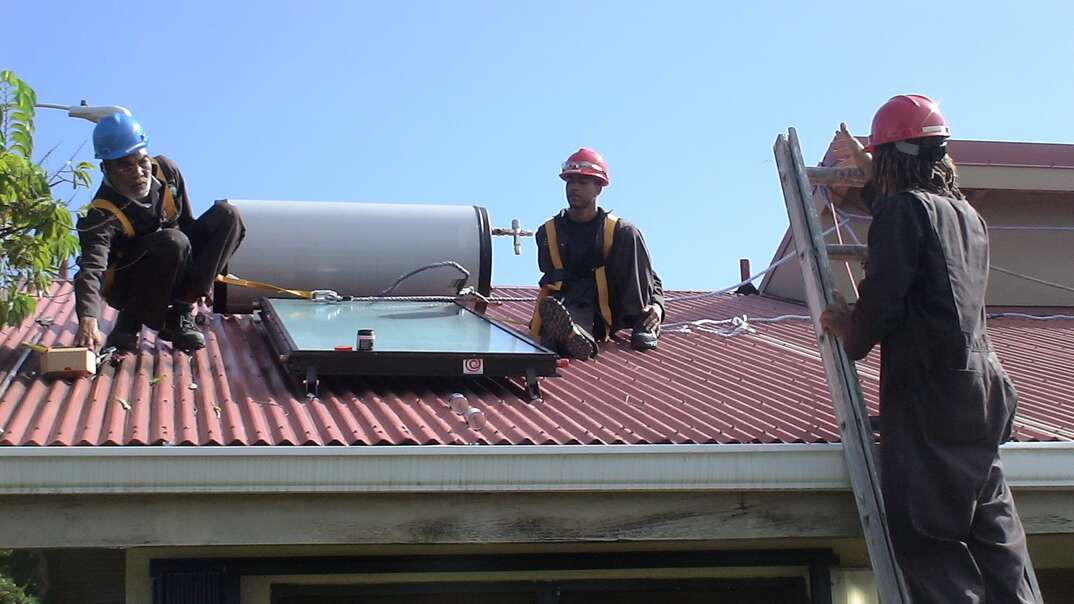- AppliancesElectriciansHVACLandscapingLocksmithPest ControlPlumbingRenovationRoofingT V RepairAll Home Improvement
- Car AccidentClass ActionCorporate LawCriminal DefenseDivorce LawEmployment LawFamily LawFinancial LawLegal AidMedical Injury LawyersMedical MalpracticeReal Estate LawWater Fire RestorationAll Legal
- InvestmentRetirementAll Finance
- Animal InsuranceAutoGeneral InsuranceHealth PolicyHome RentersAll Insurance
- DentalHealth SpecialistsAll Medical
- Animal CareVeterinaryAll Pets
- Auto GlassTowingAll Automotive
How Does a Solar Water Heater Work?

There’s nothing like a hot shower to ease away the stress of the day. But heating water accounts for 20% of your home energy use, so that shower could be adding to your worries.
Save money by switching to a solar water heater that uses free energy from the sun to heat your water.
Solar hot water systems are an alternative to traditional water heaters that use gas, oil or electricity for power. These heaters use the sun’s energy to heat water. The first solar water heater was patented in 1891, and the technology has continued to improve since then.
How Do They Work?
Solar-powered water heaters have three main components:
- Solar collector: Collects the sun’s energy
- Insulated tank: Stores the hot water
- Pipes: Connect the tank to the solar collector and your home
The sun falls on the collector, and a special surface absorbs the solar radiation. This heat energy is transferred to the water that flows through the collector. This is different from a solar electric system that converts radiation to energy. Instead, the sun essentially heats the water directly, although the collector makes the process very efficient.
The heated water is collected in the tank, and insulation ensures it stays hot. When you turn on the faucet, water goes through pipes to your home as it would for any other hot water system. Most systems also have a gas or electric component that acts as a backup. This ensures you continue to get hot water even when the sun isn’t shining.
The two main types of solar hot water systems are active and passive. Active systems have circulating pumps and controls, while passive ones don’t. Passive solar hot water heaters tend to be less efficient, but they're also less expensive and usually last longer than an active system.
More Related Articles:
- Calling a Plumber? Here Are the 6 Most Common Plumbing Jobs and How Much They Cost
- 6 Ways to Try to Unclog Your Sink Before You Call a Plumber
- What's in My Plumber's Van?
- Here's How Much It Costs to Remodel a Bathroom
- 6 Tips for Hiring a Plumber
While there are many benefits to a solar water heater, these systems aren’t for everyone. Understanding the advantages and disadvantages can help you decide whether to buy one for your home.
Pros of Solar Water Heaters
The advantages of solar water heaters include:
- Money savings: It’s estimated that a solar hot water system can cut your annual hot water costs in half. This has the potential to significantly decrease your utility bills.
- Low maintenance: Solar heaters tend to need minimal maintenance compared to traditional systems.
- Environmentally friendly system: Solar heaters don’t use fossil fuels to heat water, which reduces carbon emissions. Even if you have a fossil fuel-powered backup, you’re still cutting your carbon footprint by going solar.
- Increased home value: Green homes are becoming more popular, so adding solar hot water can let you ask for more money when it’s time to sell your home. Forbes reports that installing a solar water heater can increase your home's value by 3% to 4%.
- Tax credits: The federal government offers tax credits for solar water heaters that can help offset the initial cost of the system.
- Less space than a full photovoltaic solar system: If you want to go green but don’t have enough roof space for a full solar system, solar water heating is a good alternative. It doesn’t require as many panels as you need to power a whole house.
Cons of Solar Water Heaters
The disadvantages of solar heaters include:
- High up-front costs: The average cost of installing a solar system is $4,120 (CAD 5,509). Although you save money in the long run, there’s a large initial outlay.
- Climate dependent: Solar water heaters need direct sunlight to work. They aren't very efficient on foggy, cloudy or rainy days, which may have a larger impact in some parts of the country.
- Roof space: Although smaller than a photovoltaic system, you still need enough roof space to accommodate the solar collectors.
- Higher maintenance costs: Although solar systems require less maintenance than traditional water heaters, when they do need work, the cost tends to be higher.
- Only heats water: If you have the roof space, you may prefer to get a full photovoltaic solar system. This will provide energy savings for all your appliances, including an electric hot water system.
All CAD conversions are based on the exchange rate on the date of publication.
Elocal Editorial Content is for educational and entertainment purposes only. Editorial Content should not be used as a substitute for advice from a licensed professional in your state reviewing your issue. Systems, equipment, issues and circumstances vary. Follow the manufacturer's safety precautions. The opinions, beliefs and viewpoints expressed by the eLocal Editorial Team and other third-party content providers do not necessarily reflect the opinions, beliefs and viewpoints of eLocal or its affiliate companies. Use of the Blog is subject to the
Website Terms and Conditions.The eLocal Editorial Team operates independently of eLocal USA's marketing and sales decisions.



